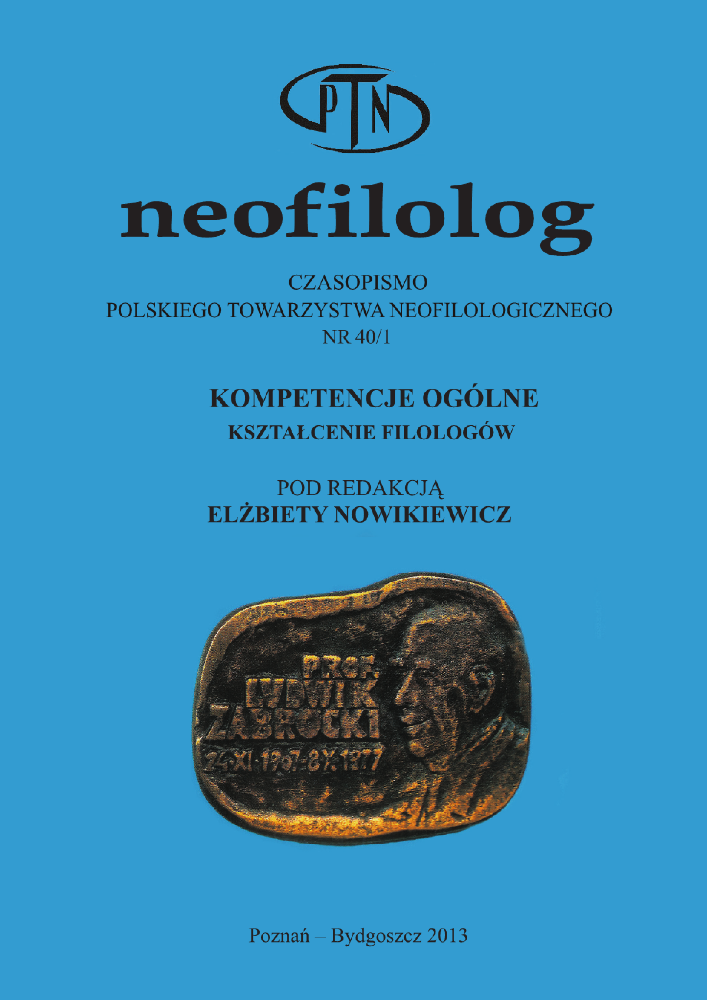Abstrakt
The paper focuses on the development of the listening comprehension of advanced students of French as a foreign language and concerns current affairs radio programs. It presents the main conclusions discussed with reference to one of the problems researched within a larger academic project conducted from 2010 to 2013. The aim of the paper is to determine some essential principles that should guide the development of questions in the pre-listening stage so that, during the subsequent while-listening stage, they could foster the individual comprehension process. The conclusions emphasize the relationship between the form and function of these pre-listening stage questions and the quality of cognitive and communicative actions performed by the listeners.Bibliografia
Berne, J. E. 2004. « Listening Comprehension Strategies: A Review of the Literature ». Foreign Language Annals 37 (4): 521-531.
Bronckart, J.-P. 1996. « L’acquisition des discours. Le point de vue de l’interactionnisme socio-discursif ». Le Français dans le Monde. Le discours : enjeux et perspectives. no spécial: 55-64.
Charaudeau, P. 2005. « Sémantique de la langue, sémantique du discours » (w) Actes du colloque en hommage à Bernard Pottier. http://www.patrick-charaudeau.com/Semantique-de-la-langue-semantique.html. DW 14.052013.
Coste, D., North, B., Sheil, J. i Trim, J. 2003. Europejski system opisu kształcenia językowego: uczenie się, nauczanie, ocenianie. Warszawa: CODN.
Coubard, E. 2003. « Habitudes culturelles d’apprentissage en activité de compréhension orale ». Etudes de linguistique appliquée 132 (4): 445-455.
Dolz, J. i Schneuwly, B. 1998. Pour un enseignement de l’oral: initiation aux genres formels de l’oral. Paris: ESF Editeur.
Górecka, J., Wilczyńska, W. i Wojciechowska, B. (w druku). « Developing second language oral competence through an integrated discursive approach: The conceptual framework of the project and the pilot study results ». (w) Theoretical, empirical and pedagogic perspectives on teaching, learning and assessing speaking skills in a second language (red. M. Pawlak i E. Waniek-Klimczak).
Grzmil-Tylutki H. 2007. Gatunek w świetle francuskiej teorii dyskursu. Kraków: Universitas.
Kamber, A. i C. Skupien. 2008. « Les documents radiophoniques dans l’enseignement de la comprehension orale ». Mélanges CRAPEL 31: 173-189.
Leaver, B. L. i B. Shekhtman (ed.) 2002. Developing Professional-Level Language Proficiency. Cambridge: CUP.
Poussard, C. 2003. « Guider des stratégies de compréhension de l’oral en ALAO: le cas de l’inférence ». Apprentissage des langues et systèmes d’information et de communication. 6 (1): 143-150. <http://alsic.revues.org/2132?lang=en> DW 30.10.2012.
Strzemeski, K. 2011. « Autonomizacja studentów poprzez ich samodzielną pracę z podcastami-plikami audio » (w) Autonomia w nauce języka obcego – uczeń a nauczyciel, (red. M. Pawlak). Poznań-Kalisz-Poznań: Wyd. UAM: 327-336.
Vandergrift, L. i Tafaghodtari, M. H. 2010. « Teaching L2 Learners How to Listen Does Make a Difference: An Empirical Study ». Language Learning 60 (2): 470-497.
Vandergrift, L., Goh C.C.M., Mareschal C. J. i Tafaghodtari, M. H. 2006. « The Meta-cognitive Awareness Listening Questionnaire: Development and Validation ». Language Learning 56 (3): 431-462.
Wilczyńska, W. i Wojciechowska, B. (w druku). « Świadomość gatunku dyskusja a rozumienie obcojęzycznych audycji radiowych ».
Wilczyńska, W. i Wojciechowska, B. (w druku). « Procédés interactifs de construction du sens dans l’émission Le téléphone sonne. Un modèle dans le développement des compétences orales élevées en L2 ». (w) Des organisations dynamiques de la langue orale (red. E. Richard i inni). Peter Lang.
Zaśko-Zielińska, M. 2002. Przez okno świadomości. Gatunki mowy w świadomości użytkowników języka. Wrocław: Wydawnictwo Uniwersytetu Wrocławskiego.
Licencja
Prawa autorskie (c) 2019 Joanna Górecka, Bernadeta Wojciechowska

Utwór dostępny jest na licencji Creative Commons Uznanie autorstwa – Bez utworów zależnych 4.0 Międzynarodowe.
Przedstawiany utwór (artykuł) upubliczniany jest na podstawie umowy z autorem i na licencji Creative Commons Attribution-NoDerivatives 4.0 International (CC BY-ND 4.0).
Użytkownicy mają obowiązek podania wraz z rozpowszechnionym utworem, informacji o autorstwie, tytule, źródle (odnośniki do oryginalnego utworu, DOI) oraz samej licencji;
- bez tworzenia utworów zależnych,
- utwór musi być zachowany w oryginalnej postaci.
Uniwersytet im. Adama Mickiewicza w Poznaniu zachowuje prawo do czasopisma jako całości (układ, forma graficzna, tytuł, projekt okładki, logo itp.).
